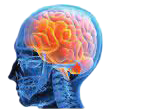Understanding Mild Cognitive Impairment
Have you noticed changes in your memory or thinking that feel a little different from what you'd expect with normal aging? You’re not alone—and there’s a name for this in-between stage: Mild Cognitive Impairment, or MCI. It falls somewhere between the usual age-related changes and more serious memory conditions. As a neuropsychologist, I often meet with people in this middle ground—where the changes are noticeable, but not severe enough to disrupt everyday life in a major way. Learning more about MCI can help you take small, meaningful steps to support both your brain and your day-to-day activities.
When we talk about "cognitive abilities," we simply mean how your brain helps you think, remember, focus, and solve problems. MCI can affect these abilities, but it doesn’t mean everything has changed or that a major decline is certain. In fact, many people with MCI still function well and remain independent. The term itself reminds us that thinking changes don’t always fit into neat categories—they often exist on a spectrum.
MCI means that while some aspects of thinking may feel more difficult than before, many parts of your brain are still working effectively. This understanding can shift the focus to what you can do, and not just what’s changed. About 15–20% of adults over age 60 experience MCI. Although it can raise the risk of developing dementia, it’s important to know that progression isn’t guaranteed. With the right strategies—such as staying mentally and physically active, building healthy habits, and checking in regularly with your healthcare team—many people with MCI continue to live well for years. Some even experience improvement in their cognitive function with the right support.
Your Unique Cognitive Profile
MCI acts differently in each person, reflecting your brain's unique complexity:
Memory-Focused MCI primarily affects remembering recent events or names—while leaving other abilities intact. Your long-term memory often continues functioning beautifully, preserving decades of meaningful life experiences.
Non-Memory MCI might affect attention, processing speed, or visual-spatial abilities—with relatively preserved memory. You might notice changes in how quickly you process information while still recalling recent events clearly.
These distinctions provide crucial insights into your brain's functioning and the most effective strategies for support.
The Powerful Path to Assessment
If cognitive changes have caught your attention, you're already demonstrating self-awareness—a tremendous asset on your cognitive health journey.
A comprehensive evaluation can uncover potentially reversible causes of cognitive changes:
Vitamin B12 deficiency can dramatically impact cognition yet improve with proper supplementation
Vitamin D optimization enhances cognitive function
Thyroid imbalances can temporarily mimic cognitive disorders
Blood sugar dysregulation affects brain performance
Don't overlook mental health—anxiety, depression, grief, and major life transitions all create cognitive challenges that improve with proper support.
Specialized cognitive testing maps your pattern of strengths and challenges, revealing not just concerns but preserved abilities that can enhance functioning and quality of life.
Living Well with MCI
Being diagnosed with Mild Cognitive Impairment (MCI) doesn’t mean you’ve reached the end of the road. Instead, it can be the start of a new focus on supporting your brain in thoughtful, practical ways. Thanks to what we know about neuroplasticity—your brain’s ability to adapt and grow—you have real opportunities to strengthen and protect your thinking skills.
Focus On Your Strengths: By recognizing what still comes easily, you can build confidence and use those abilities to support more difficult tasks. For example, if you’re good with words but find visual information harder to process, you might enjoy reading groups or storytelling activities. If you think best in pictures or through hands-on work, activities like drawing, gardening, or building things may feel more natural and enjoyable.
Utilize Tools: Notebooks, calendars, phone reminders, or visual labels can make everyday life easier. Using these strategies regularly can reduce stress, improve memory, and keep you feeling more in control.
Stay Socially Active: Despite temptation to withdraw when experiencing cognitive changes, staying socially connected is great for the brain. It activate multiple areas of your brain, provides emotional support which reduces stress, and it exercises your brain within a supportive and fun environment.
Stay Physically Active: Movement increases blood flow to the brain and stimulates growth factors.
Follow a Healthy Diet: Brain-supporting nutrition provides building blocks for neural function
Get Good Sleep: Quality sleep allows your brain's specialized cleaning system to clear waste
Minimize Stress: Stress management protects memory structures from damaging stress hormones.
Remember, your brain is more than the challenges you may face. It’s a powerful part of you that can adapt and grow over time. With the right support and a positive approach, you can manage MCI in a way that helps you stay confident, focused, and hopeful about the future.
About the Author: Dr. Susan Borgaro is a Clinical Neuropsychologist specializing in memory assessment and cognitive enhancement strategies. With over 25 years of experience working with patients across the lifespan, Dr. Borgaro brings both clinical expertise and practical insights to help people optimize their cognitive functioning. www.nasarizona.com

